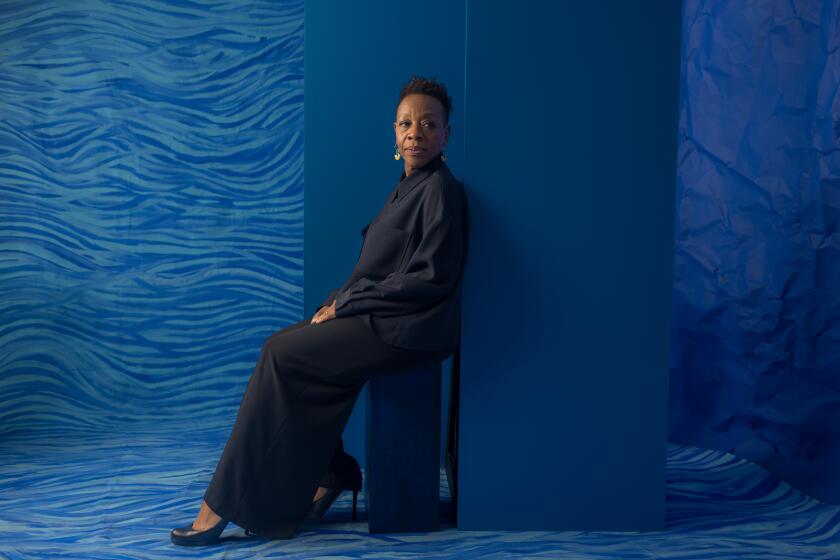
- Share via
“A Different Man” is neither a straightforward drama nor a straight thriller. Director Aaron Schimberg refuses to call it a fable — mainly because there is no moral in his moody, darkly comic tale about a man with a facial disfigurement who gets “reborn” into the conventionally handsome face of Sebastian Stan, only for his new life to take a cosmic nosedive.
But if you listen to the score, right from the opening moments composer Umberto Smerilli makes a bold declaration about what kind of movie it is: nervy, tempestuous, winking and just a little bit melodramatic.
Smerilli, 47, hails from Abruzzo, Italy, and has been scoring films in his homeland for about a decade — but “A Different Man” was his first American production. He met Schimberg when they both participated in New York Film Festival’s Artist Academy in 2017, and they immediately hit it off. The director was finishing his second feature film and told Smerilli maybe they could collaborate on the next one.

With a much bigger budget and the weight of A24 behind him, though, Schimberg was given a list of established composers and was under some pressure to go with a “name.” He also admits he was worried that collaborating with Smerilli might strain their friendship.
“So I hesitated,” Schimberg says. “And then, right before we started shooting, I said: ‘OK, what am I doing? I should give him a shot. I think this could work out.’”
Sebastian Stan plays a facially deformed actor who emerges from a miracle cure to realize he’s lost something deeper, in a movie co-starring Renate Reinsve.
Schimberg sent Smerilli the script and basically asked for an audition piece. According to the composer, Schimberg said: “You have 10 days — no more — because they are pushing me for having someone else.”
Smerilli ended a beach vacation early, ran home and read the first part of the script. Halfway through, he ran to the piano and tapped out a “somber and slow” waltz idea, and on top of it a dark, coiling melody — with “something off but also maybe something romantic in it.” It took him about 20 minutes. He recorded a loose improvisation on his iPhone, humming along with the piano and narrating his rough concept for the director.
When Schimberg got this simple recording in his inbox and listened to it, “Immediately I knew that I had made the right choice,” the director says, “and that I was an idiot for even ever doubting him.”

That theme — later orchestrated with a buzzing hive of strings, solo clarinet, piano and percussion — became the soul of the whole score. Smerilli wanted to pack many concepts into this one theme but without spoiling “the sense of ambiguity that is in the script,” he says.
“I want to convey, first of all, this darkish noir sense,” he explains, “that we’re dealing with something that is related to the dark part of our subconscious, of our soul. We are staring at the shadows. I also think it’s a story about destiny, which is mocking the main character. So I wanted to put some sarcasm into the music.”
Variations of the theme — sometimes on lonely solo piano, sometimes with an uptempo jazz energy, sometimes overwhelmingly dramatic — hound Edward (Stan) as he mopes around in his decaying New York apartment and on the subway. After Edward elects to undergo an experimental medical treatment, he begins to transform — his old face literally crumbles off — and the theme accentuates his melancholy and metamorphosis with dark beauty and sludgy textures.

Smerilli performed most of the instruments himself, including the inky depths of a contrabass clarinet, which he purchased and learned just for this score.
As the attractively re-faced “Guy,” the film’s protagonist cannot escape this theme of sarcastic destiny, and the melody reveals itself as a symbol of the real monster in the story: society and the ugly human heart.
Oscar-nominated makeup artist Mike Marino used groundbreaking prosthetics in collaboration with the actor Sebastian Stan for A24’s “A Different Man.”
The black humor and arch-fabulism of what Smerilli and Schimberg concocted took inspiration from opera and old Italian movies — they both love composer Nino Rota — as well as Duke Ellington and Bernard Herrmann. The result is a hypnotically spiraling, singable score that lends some Italian italics to the dark, damning yet deeply funny story of a man who can’t escape the ugly monster within.
“In the past, I’ve used music pretty sparingly,” Schimberg admits. “I think because I’m always dealing with ambiguous emotions, I’ve always been afraid of music tipping the balance in one direction or being too histrionic or too sentimental.”
But when he heard the completed score by his Italian friend, “I broke down in tears,” Schimberg says, “because I thought: This is all the emotion that I put into the movie, and everything that I was feeling making this movie — this is it in musical form. He’s captured it.”
He concludes: “Even if you just hear the score, I feel like you get a sense of what the movie is about.”
More to Read
From the Oscars to the Emmys.
Get the Envelope newsletter for exclusive awards season coverage, behind-the-scenes stories from the Envelope podcast and columnist Glenn Whipp’s must-read analysis.
You may occasionally receive promotional content from the Los Angeles Times.









